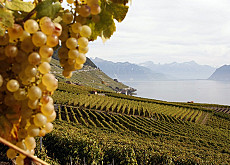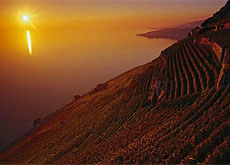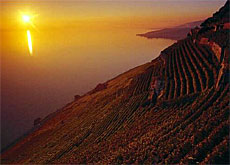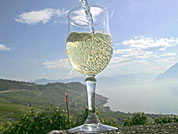Lavaux celebrates its Unesco status in style

Corks didn't stop popping after Lavaux, the spectacular wine-growing region on Lake Geneva, won Unesco World Heritage status.
A few months after the announcement in 2007, Switzerland Tourism invited some 160 journalists from around the world to visit the 800-year-old terraced region to sample local wines and fine food.
But, as swissinfo.ch found, opening up the ancient wine region to more visitors, while ensuring its protection and economic development remains a delicate balancing act.
The setting is a marketer’s dream. Early morning sunrays slowly burn through the mist hanging over the silver-blue lake. In the distance a tractor chugs up a steep narrow lane on its way to collect its grape harvest.
At the Château de la Doges vineyard near La Tour de Peilz, a group of journalists are getting a lesson on the Chasselas grape variety, while others are picking apples in the orchard.
“We’re not stressing them out. If they have a question about wine or anything else we’re there to answer,” Marc Scheurer, from Montreux-Vevey Tourism, told swissinfo.ch during the trip, which took place in September 2007, three months after the region’s Unesco status was announced.
After four days of local gastronomic delights, the journalists, mostly experienced travel writers as well as food and wine specialists, seemed generally impressed.
“I’ve been through Lavaux many times before but I’ve never stopped. I didn’t realise the vineyards were so extensive. I’ll definitely come back,” said a British travel journalist, summing up many people’s feelings.
Balancing act
Swiss tourism experts hope the internationally recognised Unesco label will throw a “huge spotlight” on the region.
“It’s a big challenge. But it allows us to better position ourselves abroad and say that Switzerland is a wine-producing country with some fabulous areas,” explained Harry John, director of Montreux-Vevey tourist board.
Tourism, however, is just one element of the official Unesco management plan for Lavaux – a detailed strategy for the site’s long-term sustainable development – alongside research, culture, economy and development of the territory.
But it’s also one of the most contentious.
“We can’t welcome hundreds of thousands of additional tourists. The structures don’t allow it. Our communication is targeting quality tourism – individuals or small groups,” explained François Margot, president of Montreux-Vevey Tourism.
Sorry, no room
Local winegrowers, like Jacques Joly from Aran, acknowledge that the region must reorganise itself, both in terms of overall welcome and accommodation.
“It’s a delicate question. We know that hotel rooms are lacking in the region, but we can’t talk about building to welcome people,” said Joly, referring to Lavaux’s strict building laws protecting local heritage.
The local tourism board foresees a five-to-ten per cent increase in tourists over the next three years.
Montreux-Vevey Tourism hopes that more hotel rooms in neighbouring towns, bed-and-breakfast accommodation or actually staying with the vineyard owner should solve the problem.
“But the most important thing is that we respect the people who live in the region,” added the tourist board director. “It’s not going to be a kind of prostitution of the region, but on the other hand it cannot be a zoo and people just coming like Disneyland and going through. It has to be a lively area.”
Father to son
In general, local wine producers welcomed the visiting press – and Unesco label – with open arms.
“The more media talk about Lavaux can only be positive,” said Henri Montet, president of Vevey-Montreux wines.
Bernard Bovy, a local winegrower and president of Lavaux’s Unesco inscription committee, felt the label should give the small region important visibility to help it develop its wine tourism sector during difficult times.
“If we want the vines to remain, the winegrowers have to be able to sell their wines,” said Bovy. “If we don’t do anything to make ourselves known, I fear that one day things will become dramatic. I want my children and grandchildren to be able to cultivate the vines here.”
Simon Bradley in Lavaux, swissinfo.ch
The Lavaux Vineyard Terraces, stretching for about 30km along the south-facing northern shores of Lake Geneva from the Chateau de Chillon to the eastern outskirts of Lausanne in the Vaud region, cover the lower slopes of the mountainside between the villages and the lake.
Although there is some evidence that vines were grown in the area in Roman times, the present vine terraces can be traced back to the 11th century, when Benedictine and Cistercian monasteries controlled the area.
It is an outstanding example of a centuries-long interaction between people and their environment, developed to optimise local resources so as to produce a highly valued wine that has always been important to the economy.
Source: Unesco
Lavaux is a district located on the northeastern shore of Lake Geneva between Lausanne and Vevey.
Lavaux belongs to the most prestigious Swiss wine-growing regions and consists of 840 hectares of terraced vineyards and 28,000 residents.
The region benefits from a temperate climate, but the southern-facing terraces and ancient stone walls give the area a Mediterranean feel.
The wines produced are mainly Chasselas (68.5%), Gamay (10.9%) and Pinot Noir (11.5%). They are regrouped into eight Appellations d’origine contrôlées (AOC) or protected designation of origin wines: Calamin, Chardonne, Dézaley, Epesses, Lutry, St-Saphorin, Vevey-Montreux and Villette.

In compliance with the JTI standards
More: SWI swissinfo.ch certified by the Journalism Trust Initiative




You can find an overview of ongoing debates with our journalists here. Please join us!
If you want to start a conversation about a topic raised in this article or want to report factual errors, email us at english@swissinfo.ch.